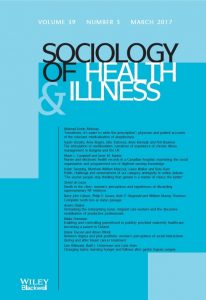Weighing the blame for illness: biology versus personal responsibility
Part of MSNBC’s lineup includes an hour-long daytime show hosted by the physician, Dr. Nancy. In a segment of her show on Monday, August 31st, she hosted a panel to address the “war on fat people.” Panel members discussed topics such as the etiology of obesity and how the obese are treated in the US. Articles of a similar nature have appeared elsewhere, including the one below, which was featured in a recent edition of Newsweek. Overweight Americans have long been a target of criticism and mockery and even as other behaviors, addictions and illnesses have been at least partly de-stigmatized, obesity seems to be left in the cold. In other words, the discussion surrounding obesity has a similar tone to debates over other conditions and/or illnesses that are under scrutiny both in American society and globally. The tension is about the attribution of blame and the pendulum swings back and forth between personal responsibility and genetic predisposition. Who or what do we blame for obesity, depression, diabetes, addiction, etc.? How do we assign responsibility for the existence of illnesses when there is evidence that biology and lifestyle, environment, culture and elements of the social structure of a society impact said condition? Of late, most mental illness (both “milder” afflictions such as depression and anxiety as well as more severely impairing conditions like schizophrenia), and physical illness are attributed to problems in biology or chemical imbalances. However, when it comes to obesity, Americans are quite reluctant to accept the biological blame game and this is highly consequential for the way in which overweight individuals are seen and understand themselves and their experiences.
Even more potentially problematic than the lack of attribution of cause to biology is the blaming of individual disposition. This goes beyond an unwillingness to see the underlying biological influences on obesity, which is rather paradoxical in a society that biologicizes most things. The Newsweek article mentioned above (and linked below) claims, “Fatness has always been seen as a slight on the American character. Ours is a nation that values hard work and discipline, and it’s hard for us to accept that weight could be not just a struggle of will, even when the bulk of the research—and often our own personal experience—shows that the factors leading to weight gain are much more than just simple gluttony.” Even in contemporary society, there seems to be deep-rooted resistance to the idea that anything other than failure of personal character and lack of self control causes obesity. As I mentioned above, this is quite a contrast to how readily doctors and Americans in general tend to biologicize psychological conditions like Post-traumatic stress disorder (which is at least partly caused by trauma – something rooted in the environment) and how readily we take the blame off of individuals for addiction (which is at least partly caused by a behavior and availability of substances). This is perhaps most obvious with physical conditions such as heart disease and high blood pressure. We think of these as being heritable conditions, but certainly the effect of diet and exercise might decrease the chances of negative consequences. Additionally, heart disease might be affected or even caused by personal choices or, for instance, living in a neighborhood with lack of access to healthy foods and safe conditions in which to run or play sports. In sum, many conditions that we see as biological are also clearly affected by behavior, choices and one’s surroundings. In other words, while all of these conditions may have biological components, there are other contributing factors that we often readily ignore. When it comes to obesity, we are much less willing to do this and in fact are much more likely to see everything but the biological.
Americans seem to be pre-occupied with attributing blame in general, masters at claiming to be able to identify causal pathways, but there are consequences of definitive claims about biological (or any) causality. There is an argument that biologicizing illness takes the blame off individuals. Recently, several sociologists examined the effect of biologicizing illness (specifically mental illness) and discovered that blaming genes takes some stigma away from the individual (genetic responsibility means that individual choices and lifestyles did not cause the condition). Presumably, then, this means that, when we conceptualize something as rooted in the behavior or choices of an individual, there is greater stigma. In other words, not attributing obesity to biological factors and blaming it on the poor will-power, lack of self-control or decision-making of individuals would lead to high stigma. However, there is also an argument that this makes people feel as though nothing they do or nothing about their lives affects their condition – they are destined to have the illness in question and therefore nothing about the environment matters. There seems to be a fine balance between blaming people for conditions they do not have complete (if any) control over and blaming biology, which reduces our focus on anything other than the genetic factors.
The larger questions raised by the arguments surrounding the cause of obesity are about the need to assign blame in general. Is this a part of human nature, something about American culture? Social psychologists believe that we attribute blame to what we perceive as others’ shortcomings, to their choices, to their character, to their person (of course we tend not to do this when it comes to ourselves). For a long time, illnesses such as depression were attributed to a person’s character and sufferers were considered lesser for not being able to pull themselves up by their bootstraps and carry on. Once causality was attributed to biology, a certain amount of that stigma disappeared. Perhaps the future of obesity is one in which, with increasing attribution to genetic causes, stigma will decrease. It certainly tells us something about the perceptions and beliefs of Americans that we seem to be resistant to the idea of biological attribution (or anything other than blaming character) for obesity but not for the majority of other common conditions.
The Fat Wars: America’s Weight Rage
“Evil Habits” and “Personal Choices”: Assigning Responsibility for Health in the 20th Century







Very informative; thank you!
http://www.theprettyproject.com
Obesity runs in my family. I realized when I found out who they were how seriously I need to take my own weight struggles. I am a size 14-16 and have struggled all my life. Early in my life, depression contributed to my weight because I just did not care. Later, I took on responsiblity of my weight and realized with better eating habits and lots of excercise I can at least maintain my weight and/or lose my unwanted weight. It seems to take lots of excercise in order to keep it off and lose it.
Fantastic post – thank you – see blog below to find ways to battle this epedemic. Thank you!
Michael Wood, CSCS
http://www.michaelwoodspg.blogpost.com
nice post…US &many developed countries are a nation that values hard work and discipline, and it’s hard for them to accept that weight could be not just a struggle of will….
well, to me sedentary &instant lifestyle (franchised junk food restaurants) doesn’t seem to contain hard work and discipline…
http://ProcrastinationGods.wordpress.com
You have made some very interesting comparisons here to demonstrate an interesting point about American perspectives on obesity and other health conditions. Thanks!
Keri